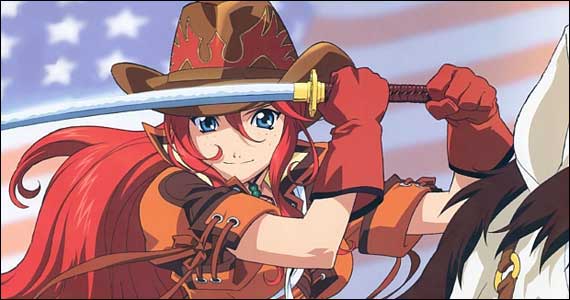
Within an alternate and slightly steampunk infused depiction of 1920’s New York City, the Little Lips Theater serves as a cover for an elite force of agents known as the STAR Division, who use mech suits to battle evil while also performing in musical dramas to raise the spirits of the city they defend – rounded out with a Samurai and a Cowgirl searching to find their place within the city and that group of heroes.
I’ve really come to savor telling people about this game over the past few weeks, because they can’t help but laugh and scratch their head over how a structured game would even begin to make unifying sense of those ideas with any degree of success. Sakura Wars: So Long, My Love is a game exploding with ideas, a late to the party visitor from Japan that has curiously shown up on North American shores exactly when titles of this kind are needed most – hard pressed as we’ve been for new releases that don’t wear their glib intention entirely in the straight-to-the-point box title making them 90% marketing, 9% entertainment, and 1% any of the fanciful things we’d like to say about the medium’s artful possibilities, were we not generally sick of kicking that dead horse.
Sakura Wars opts for putting the horse in an apartment, and brings an energy that succeeds in blazing a path free of any genre binding obligations or easy explanations – great for gamers, bad for indexing.
And in a rare twist Sakura Wars isn’t one of those games where I laud the ideas and forgive the actual playing of the game. I don’t need to make any excuses for a game that’s every bit as fun to play as it is to talk about, I just have to try and clear up what the hell is going on when playing it.
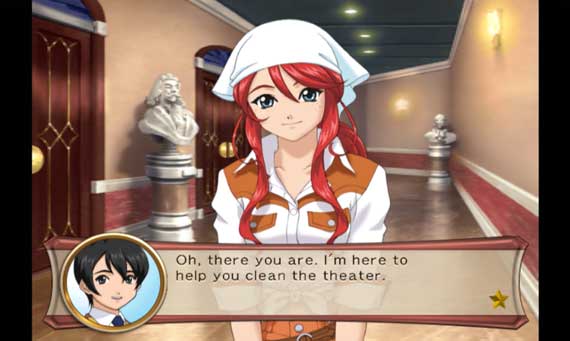
With as many straightforward words as I can gather, which isn’t many, this visitor from the Japanese series is an interactive novel peppered with sessions of strategy RPG, while also serving up a dating sim-esk atmosphere that focuses on building relationships. And unlike many recent releases that seem to layer in slices of traditional gameplay as if by obligation, Sakura Wars’ strategy portions are surprisingly strong breaks from the narrative that serve up rewards from gains made during the story and arrive like dessert during every chapter.
The game opens with a lengthy dose of that interactive novel angle, placing players in the shoes of Shinjiro Taiga, who is immediately transferred to the New York Combat Revue to set the story in motion. Confronted by the varying personalities of the team and struggling to prove himself, the game feels a bit like watching / reading an anime series at first glance. And yet this isn’t an experience that suits a casual observer.
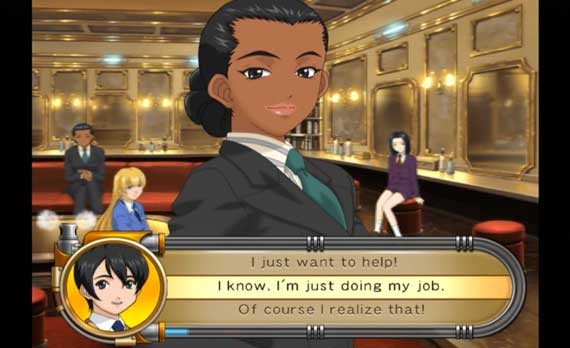
I’ve had a hard time putting words to the game, earnestly thrown off by just how deeply character driven the experience is. Where the game delivers character sequences that play out like a digital novel, there are interactive moments that make it something more than that, but it’s all very subtle and personal to my playing of it. Shinjiro doesn’t simply catch up on the backstory motivating the characters he meets, each chapter of the game creating opportunities to learn about them as the story moves forward and creating what I’ll risk suggesting are real bonds to invest the player.
Within the second chapter for instance, Shinjiro is drawn into a court case that requires the player to search out information around the city to both win the case but also to learn more about Cheiron, the hard nosed legal minded member of the STARS Division that gives him an obligatory hard time from the beginning. An overhead map at times allows players to visit different parts of the city, then offering a 3D environment where different buildings and locations serve up more story sequences and character interactions.
The preoccupation here is on building relationships, driven home by an interactive element called LIPS, quicktime events and mini-games that require you to pick a certain response or operate a device within a set amount of time, which affect the strength of the relationship between Shinjiro and other key characters.
That idea certainly sounds very passive, but there’s always this strange, cold sweat I feel trying to quickly pick the answer that most represents how I would respond. And that’s when I suspected the game was having the desired affect on me, when that connection made me legitimately concerned about offending characters, bringing me back to this loss for words that would make it much easier if I could only stick the game in your hands right about now.
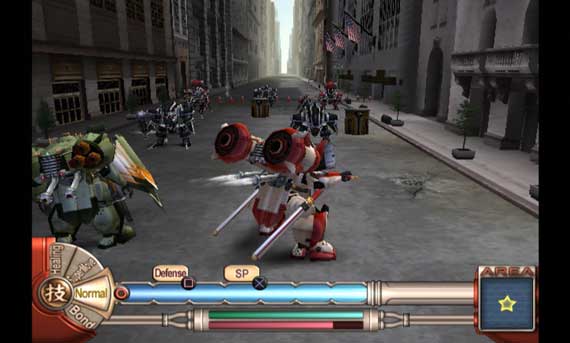
The chapters themselves, from the television-like promo to the character situations supporting the story arc within each one, is complete anime infused turns at the crazy, the heartfelt, the cheesy, and the humorous – strengthened and made playable by voice acting and localization that is NIS America at the top of their game, as if all the elements they do so well finally found the perfect bed to settle into. There are moments where I was left grinning like an idiot at the eccentricity of it, particularly the over-the-top start to battles, which lifts the theater above ground to launch the team into action while your boss and theater owner exclaims that it’s “SHOWTIME!”
From there the player steps into a strategy game that takes gains from the narrative and offers enough variety to the typical SRPG formula, sans the grinding, to create a memorable and worthwhile series of bite-sized gaming sessions that enhance the experience where other games would break it.
Once deployed with the mech, the player has command over the STARS Division members, allotted a set amount of movements per turn – which are eaten up by moving closer to enemies, healing, and attacking. One very sweet feature is that the game allows the player to move a character around before committing in realtime, which is an immense aid in discovering the better strategy for each attack.
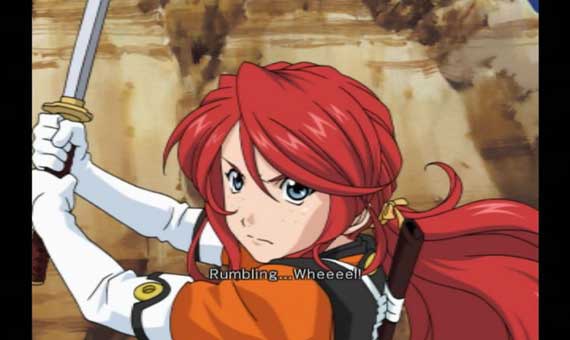
Regular attacks are issued with the press of a button, depleting the mobility gauge with each press, and with a set amount of presses issuing a combo – which causes some additional strategy when considering how much health an enemy has left and how many moves you might want to use up in finishing them off. Additionally there are super attacks that charge when damage is taken or when the player devotes mobility points toward it, and joint attacks that allow another team member to strike at the enemy when two characters are close enough to deliver the assault – strengthened by the bonds those two characters have developed during the story sequences.
The latter two attacks come complete with elaborate battle cries and cinematic actions that tap the irresistible cheese factor I was hitting at earlier and which I have greatly reveled in.
The game finds ways to continually surprise and break away from the often lower expectations I have for strategy games, most importantly by breaking the dry boredom most seem to set as a design priority. The very first battle requires your mechs to turn into jets and take the battle to the skies in defeating a giant robot. The battle at the end of chapter two suddenly allows you to move team members to different areas and introduces battle formations that allow you to set the agenda between offensive and defensive for your team.
Sakura Wars is anything but lazy when it comes to its strategy agenda, aided by the fact that these segments are always fast and objective filled – walking a fine line of challenging without crushing quite well I might add.
I still have absolutely no idea what to classify So Long, My Love as. I’m leaning toward the short and sweet version that attempts to convince you straight out that Sakura Wars is one of the most pleasant surprises of the year, the strangest and most entertaining step outside the everyday that you could possibly pick up right now. There’s no challenge in saying that there’s simply nothing to compare it to on the shelves, and no hesitation on my part in saying that if you’re looking for a truly memorable break from the viscous cycle, that Sakura Wars: So Long, My Love is the horse to bet on.
Sakura Wars: So Long, My Love
Developer – Sega
Developer – Red Entertainment
Developer (US Release) – Idea Factory
Publisher – NIS America
System – Nintendo Wii, PlayStation 2 (Nintendo Wii Reviewed)
Release Date – March 30, 2010
*A copy of this title was provided by the publisher for review
Good thing you linked this to the new 4cr site since that ups the odds of more people seeing your work over here at Gamesugar.
Since it’s $40 at the Rosenqueen store along with the artwork that seems to be the way to go. Unless you want to part with your copy of the game hahaha.
Comment by EdEN — April 23, 2010 @ 11:53 am
I grabbed the PS2 LE w/ Japanese voice track for $36.99 shipped when it released. It sits on my shelf looking pretty however… I wonder how different the Wii & PS2 versions are (other than the obvious lack of Japanese voice track on Wii)?
Comment by Ujn Hunter — April 23, 2010 @ 3:35 pm
The PS2 copy is very pretty. Not having played it on PS2 yet, I gotta imagine some of the interactions are more natural with the analog thumbsticks of the PS2 versus the control pad on the WiiMote. In fact my only complaint during my initial time with it was that it didn’t seem to explain those actions, like a half-turn motion as well as I’d like.
Comment by Jamie Love — April 23, 2010 @ 4:31 pm